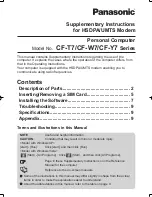
QuercusVL Programming Manual
C++:
static Units get_Units( )
C:
does not exist
In C++, the collection of units in the system is returned.
In C, there is no representation of the collection “Units”, but methods to directly access
to its properties:
●
int VL_System_get_Units_Count ( ): number of units in the system.
●
int VL_System_get_Units_Item ( int item ): returns the unit located at the
specified position inside the unit collection (starting from zero).
If there is no Unit at the specified position, returns null.
●
int VL_System_get_Units_Id ( int id ): returns the unit with identifier “id” inside
the unit collection.
If there is no Unit for the specified identifier, returns null.
3.4.2. Methods
●
Initialize
C++:
static bool Initialize ( const char *iniFile, const char *logFile, ISystemEH
*systemEH )
C:
int VL_System_Initialize)(const char * iniFile, const char* logFile,
VL_ISYSTEMEH_ONREALTIMEINFORMATION,
VL_ISYSTEMEH_ONINCIDENCE,
VL_ISYSTEMEH_ONSUMMARY,
VL_ISYSTEMEH_ONNOTIFICATION,
VL_ISYSTEMEH_ONINPUTCHANGE)
Initialize the system with the specified configuration and log files. Returns true if the
system initialized successfully, and false otherwise.
In C++, the function expects path and name of configuration and log files at the
“iniFile” and “logFile” parameters respectively.
In C++, the parameter “systemEH” is a pointer to a ISystemEH derived class object,
needed to launch events.
In C, the pointers to functions (callbacks) must be passed as parameters to launch
events. The declaration of these functions is indicated in Events section of the class. If
you don't need to capture any of these events, you can pass NULL instead of the
pointer to callback function.
●
Terminate
C++:
static void Terminate ( )
C:
void VL_System_Terminate ( )
Quercus Technologies
28















































